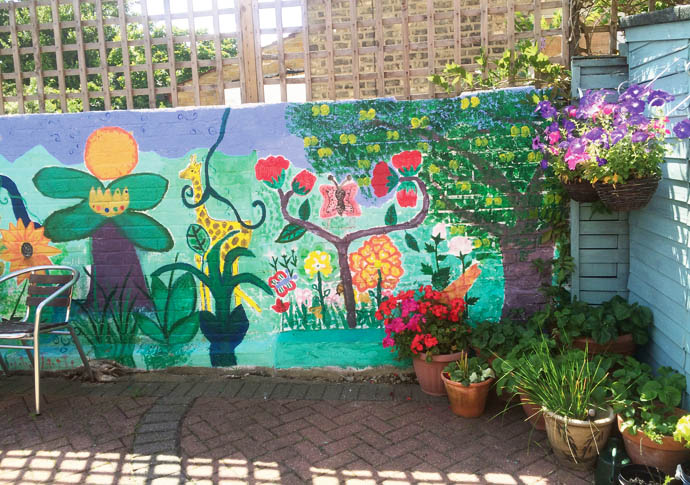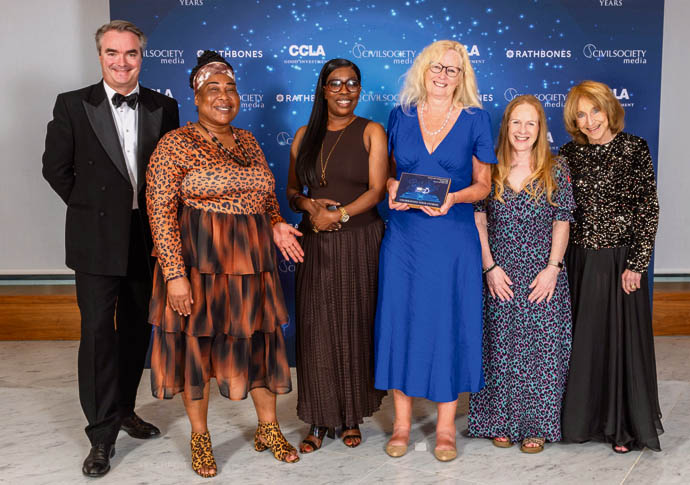How Pippa brought therapy to sex workers suffering on streets
Charity run by former hospital worker supporting victims of street prostitution and trafficking
Friday, 8th August 2025 — By Ottoline Spearman

Pippa Hockton with Street Talk therapists and the board of trustees
A MAN walked into a room on the sixth floor of the Royal Free Hospital. Although he could afford private therapy, he had chosen to wait for an NHS appointment. He was a familiar type: well-dressed, middle-class, anxious and depressed.
But this figure, who held a position of power in our community, admitted to his therapist Pippa Hockton, unashamedly, that he derived pleasure from slashing street prostitutes across the face with a knife.
He cannot be named but this was the catalyst for Street Talk, a charity Pippa founded in 2005 to provide therapy to the most marginalised women. Today, it supports around 150 victims of street prostitution and trafficking each year, all of whom have suffered childhood abuse.
Pippa is telling me this from a brown leather sofa at her home in Warwickshire, a blank wall behind her on Zoom. Her tone is soft but urgent, one hand supporting her neck while the other cuts sharply across her cheek in quick, slashing gestures.
The man had told Pippa “no one cares what happens to those women” – a line that has stayed with her. “His carelessness and lack of fear of consequences when he was a pillar of society, that was what stuck.”
When she pitched the idea of a therapy service for women in street prostitution to NHS colleagues in the early 2000s, it was dismissed.
“I was virtually asked to get into bed on the psychiatric ward myself,” she says, shaking her head. “Everybody said, the women you want to work with, they don’t have the capacity to engage in therapy.”
Street Talk now offers continuous therapy to women for up to two years. Pippa is adamant about the importance of long-term, stable relationships in healing trauma.
She describes the need to “hold the therapy space” when a woman doesn’t attend a session.
“It’s a bit like the unconditional ‘your family will always have your back’, no matter how badly you behave,” she says.
While in the NHS, Pippa began to feel the number of sessions offered wasn’t enough, and with recent welfare cuts, the role of charities like Street Talk becomes even more urgent.

A mural in a hostel for trafficked women, painted by Street Talk women
“It’s kicking the vulnerable when they’re down,” she said.
One woman told Pippa she had experienced a sudden clarity – not about being in prison, but about her life. At age five, she was attacked by a stranger in a park. She went back to school the next day, and no one spoke about it.
“She became the strange child in the class that nobody wanted to play with,” says Pippa.
“She had behavioural difficulties, was excluded from school, and descended into the criminal justice system and then addiction.”
Before founding Street Talk, Pippa volunteered weekly at a shelter in Dalston, speaking with women in a room under the eaves, accessible only by a rickety ladder, conducting sessions under duvets by torchlight. The first time, she was too scared to go in: “I suddenly thought, oh my goodness, I’m going to be eaten alive. I’ll be perceived as this entitled, middle-class, educated princess who’s come down from her tower at the Royal Free.”
But then she saw a woman with a scar across her cheek. “I thought, oh my God, is that one of the women he put this scar on?”
When the shelter abruptly closed, Pippa was galvanised to create a permanent space to support these women. Two decades later, the team includes 12 therapists and six trustees – three of whom have spent time in prison.
“If it weren’t for Pip and Street Talk I wouldn’t be here today,” says Colleen Rhodes, who met Pippa after being released from HMP Bronzefield.

Street Talk at this year’s Charity Awards. Pippa said their award ‘is for every woman who has ever come to Street Talk and trusted us with her story – that takes courage’
Colleen is bipolar and was on remand for 10 months before her trial. She had been in a unit for the mentally unwell, incarcerated for burning her ex-husband’s clothes. When her case went to court, the judge released her on probation, calling it a psychotic episode.
Colleen received two years of therapy and later joined Street Talk’s board. Now firm friends, her only criticism of Pippa is that she’s “too modest”.
The women Street Talk helps often turn to sex work following childhood trauma – either forced into brothels or selling sex out of desperation.
“It starts with the trauma. Then it’s addiction, then sex work to support the habit, then more violence,” says Pippa. “That’s the vicious cycle they’re stuck in.”
One woman came to the UK with her baby on a small boat. “Her baby was crying, and the trafficker said, ‘Shut your baby up.’ She said, ‘He’s thirsty.’ He said, ‘I’ll give him water.’ And then he snatched the baby and threw him into the sea.”
Pippa sees the government’s crackdown on asylum seekers as a vote-winner. “It’s criminalising people who are just trying to stay alive,” she says. “If you’re desperate enough to get on one of those little boats, all you’re doing is trying to stay safe.”
Speaking about the recognition of recently winning the Charity Awards, Pippa says: “It’s moving that such a tiny charity as Street Talk should be recognised alongside charities such as Oxfam.
“The award is for every woman who has ever come to Street Talk and trusted us with her story. That takes courage.”
In the early days, Pippa had a meeting with a Camden Council officer in charge of allocating funds for excluded groups. She was told the women she worked with were “too excluded for the exclusion budget”.
Despite the stories she hears daily, Pippa remains optimistic.
“How can I ever be sad for myself when I sit with people who’ve survived such experiences?”